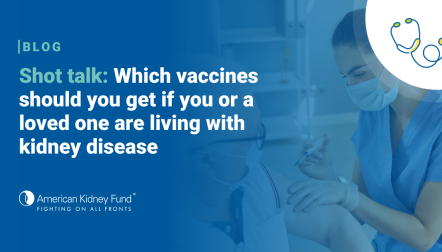
Blog post
NEW: All people with kidney disease at risk of severe COVID-19 illness, per CDC

People who have any stage of kidney disease are now considered to be at high risk for severe illness from COVID-19, according to a recently expanded list from the Centers for Disease Control and Prevention (CDC). Only people living with kidney failure who require dialysis or a kidney transplant were initially listed as being at high risk. New data about the coronavirus has led the CDC to add all stages of kidney disease, not just kidney failure, to the list of conditions that place people at higher risk for severe illness.
The updated list now includes these underlying conditions:
- Kidney disease
- COPD (chronic obstructive pulmonary disease)
- A weakened immune system from solid organ transplant
- Obesity
- Serious heart conditions
- Sickle cell disease
- Type 2 diabetes
What this list means
This announcement does not change the likelihood that anyone with these conditions will become infected, but it does mean that people who have these underlying conditions are more likely to experience severe symptoms or require hospitalization if they do get COVID-19.
Having more than one of the above conditions puts you at an even greater risk of severe illness from COVID-19.
Specific guidance for people living with kidney disease
If you have kidney disease of any stage, it is important that you take proper precautions to keep yourself safe while managing your condition. You must continue to take all your medicines as prescribed by your doctor. You should also try to stock up on a supply of the medicines you take and kidney-friendly foods you eat to limit your trips to stores.
If you are on dialysis, you must keep going to your life-sustaining treatments. Contact your dialysis center or your doctor if you have concerns about safety or if you are having any symptoms of COVID-19. Make sure you have a supply of medicines on hand and stock up with foods and drinks recommended in the 3-day emergency kidney diet.
If you are living with a kidney transplant, you must keep taking all your medicines, including your immunosuppressive drugs, to avoid rejection. You should practice social distancing at all times and talk to your transplant center about other special steps you may need to take as a high-risk person to avoid getting COVID-19, as well as what to do if you think you are sick.
How to protect yourself and others
Even if there is not a rise in COVID-19 cases or deaths where you live, it is still important to take steps to keep yourself and others safe. You can limit your potential exposure to COVID-19 by practicing social distancing (staying at least six feet away from other people) and avoiding crowds and unnecessary risks. Consider getting groceries delivered instead of going to the store, ordering curbside pickup instead of eating at a restaurant and exercising inside your home or outdoors instead of at a gym.
The CDC also recommends:
- Washing your hands frequently with soap and water for at least 20 seconds, or using hand sanitizer whenever soap and water are not available
- Limiting contact with and disinfecting commonly touched surfaces or shared items
- Wearing a cloth face covering whenever you leave the house or are around people you do not live with
We put together a Coronavirus Reopening Guidance for Kidney Patients checklist to help you make sure you are taking the right steps to minimize your risk.




